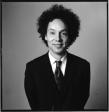Gladwrong

Malcolm Gladwell has produced another his his maddening synthetic, wafer-thin analysis of pop and Big Brain theory for this week's New Yorker. He's writing about how we can quantify greatness in sports--itself a silly idea--and early on makes a distinction between teams sports like basketball and baseball and individual sports, such as tennis and golf. He asserts that you can identify the best more easily in tennis and golf, because those sports are played week and week under similar conditions. He then goes on to maintain that no one would dispute that Roger Federer is the best tennis player on earth.
First off, tennis and golf are played under wildly differing conditions week after week. Even during, say, the clay-court tennis season, the clay will be fast one week, and even one day, then slow the next. Balls vary. So does the weather. Ditto golf. Every course is different, and it could always rain, or be very hot and humid, or the wind could blow 40mph.
Secondly, Federer is not necessarily the best tennis player on earth. He is certainly the most successful professional tennis player on earth at the moment, but he is not the best tennis player on clay (Rafael Nadal is), and has only in the past few years become the best tennis player on a hard court. Federer has become very good at playing and winning tennis tournaments worldwide at the professional level. This is not the same thing as being the best player.
For example, Yannick Noah, in his day, was a very good professional tennis player, but he was not interested in winning tournaments all over the world and in becoming widely regarded as "the best." He just wanted to win his national tournament, the French Open, once. This he accomplished in 1983. Afterwards, he concentrated on being a beloved figure to his countrymen and on exploring his talents as a reggae musician. Could he have won more? Of course. He has a beautiful serve and a fluid, graceful game. Wimbledon was within his reach. But he had different desires.
My point is that this happens all the time. The best or the potentially best choose not to compete. This is of zero interest to this odious new breed of sports statistician, for who the evaluation of talent, through performances metrics, has an obvious financial motive. Various ratios and computations can purport to tell an owner or investor whether a star hoopster is worth millions each year. A lot of coaches can tell you that just by watching the guy in practice for 20 minutes.
Take Buddy Marucci. A fortysomething Pennsylvania businessman at the time, he took Tiger Woods to the limit in the championship match of the 1995 US Amateur (Woods won). A longtime amateur of superb pedigree, Marucci decided after a successful college career to pursue business instead of golf, as he figured he was be more succesful and happier off the PGA Tour. He was. Still, he remained a wonderful golfer, one who was more than able to give the soon-to-be-greatest-golfer-in-the-world a run for his...well, not yet his money, but you know what I mean.
In some respects, does this not make Marucci a "better" golfer than the professional who grinds along on tour, practicing constantly but rarely winning? Personally, I have much greater respect for the athlete whose abilities are harder to quantify, but whose talent is real nonetheless.
Gladwell fails to take this into account, Moreover, he needlessly complicates athletic execution in the service of his thesis. which is drawn from his usual glib refashioning of some quasi-academic research that might be of use to money people. Sometimes, the best are the best because they choose not to compete.



0 Comments:
Post a Comment
<< Home